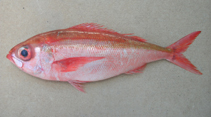Plagiogeneion rubiginosum (Hutton, 1875)
Rubyfish
Add your observation in Fish Watcher
| Native range | All suitable habitat | Point map | Year 2050 |

|
| This map was computer-generated and has not yet been reviewed. |
| Plagiogeneion rubiginosum AquaMaps Data sources: GBIF OBIS |
Upload your photos and videos
Pictures | Google imagePlagiogeneion rubiginosum
Picture by Yau, B.
Pictures | Google imagePlagiogeneion rubiginosum
Picture by Yau, B.
New Zealand country information
Common names:
Ruby fish, Rubyfish
Occurrence: native
Salinity: marine
Abundance: | Ref:
Importance: | Ref:
Aquaculture: | Ref:
Regulations: | Ref:
Uses: no uses
Comments: Recorded from bottom trawls off the east coast of South Island (Ref. 58461). Type locality. First record in the Chatham Islands (Ref. 45493). Voucher specimen(s) held at the NMNZ. Also Ref. 4537, 5325, 10394, 28705, 75154.
National Checklist:
Country Information: https://www.cia.gov/library/publications/resources/the-world-factbook/geos/nz.html
National Fisheries Authority: http://www.fish.govt.nz/
Occurrences: Occurrences Point map
Main Ref: Paulin, C., A. Stewart, C. Roberts and P. McMillan, 1989
National Database:
Occurrence: native
Salinity: marine
Abundance: | Ref:
Importance: | Ref:
Aquaculture: | Ref:
Regulations: | Ref:
Uses: no uses
Comments: Recorded from bottom trawls off the east coast of South Island (Ref. 58461). Type locality. First record in the Chatham Islands (Ref. 45493). Voucher specimen(s) held at the NMNZ. Also Ref. 4537, 5325, 10394, 28705, 75154.
National Checklist:
Country Information: https://www.cia.gov/library/publications/resources/the-world-factbook/geos/nz.html
National Fisheries Authority: http://www.fish.govt.nz/
Occurrences: Occurrences Point map
Main Ref: Paulin, C., A. Stewart, C. Roberts and P. McMillan, 1989
National Database:
Common names from other countries
Classification / Names Κοινά ονόματα | Συνώνυμα | Catalog of Fishes(Γένος, Είδη) | ITIS | CoL | WoRMS | Cloffa
> Eupercaria/misc (Various families in series Eupercaria) > Emmelichthyidae (Rovers)
Etymology: Plagiogeneion: Greek, plagios = oblique + Greek, geny, genyos, diminutive = face (Ref. 45335).
Etymology: Plagiogeneion: Greek, plagios = oblique + Greek, geny, genyos, diminutive = face (Ref. 45335).
Environment: milieu / climate zone / depth range / distribution range Οικολογία
Θαλασσινό(ά) βαθύβιο(ς); εύρος βάθους 30 - 600 m (Ref. 106682). Deep-water; 22°S - 40°S, 14°E - 170°E
Κατανομή Χώρες | Περιοχές FAO | Οικοσυστήματα | Παρουσίες | Point map | Εισαγωγές | Faunafri
Southeast Atlantic: Vema Seamount west of Cape Town and off Algoa Bay, and Walvis Bay in Namibia. Southern Indo-West Pacific: St. Paul and Amsterdam Islands, southern Australia, and New Zealand.
Μέγεθος / Βάρος / Age
Maturity: Lm ? range ? - ? cm
Max length : 60.0 cm TL αρσενικό/απροσδιόριστο; (Ref. 5325); common length : 40.0 cm TL αρσενικό/απροσδιόριστο; (Ref. 115123); μεγ. αναφερόμενη ηλικία: 10 έτη (Ref. 35378)
Max length : 60.0 cm TL αρσενικό/απροσδιόριστο; (Ref. 5325); common length : 40.0 cm TL αρσενικό/απροσδιόριστο; (Ref. 115123); μεγ. αναφερόμενη ηλικία: 10 έτη (Ref. 35378)
Short description Κλείδες προσδιορισμού | Μορφολογία | Μορφομετρία
Ραχιαίες άκανθες (συνολικά) : 12; Μαλακές ραχιαίες ακτίνες (συνολικά) : 10 - 12; Εδρικές άκανθες: 3; Μαλακές εδρικές ακτίνες: 10. Rosy pink in color, brownish dorsally, silvery below; fins red, tips of caudal fin blackish (Ref. 5325).
Adults occur near sandy or muddy bottom in deep water. Feeds on larger zooplankton (Ref. 3394). Marketed fresh or frozen and proves to be an excellent foodfish (Ref. 115123).
Life cycle and mating behavior Γεννητική Ωρίμανση | Αναπαραγωγή | Γεννοβολία | Αβγά | Γονιμότητα | Προνύμφες
Main reference
Upload your references | Αναφορές | Συντονιστής : Heemstra, Phillip C. | Συνεργάτες
Heemstra, P.C., 2016. Emmelichthyidae. pp. 2526-2533. In K.E. Carpenter and N. De Angelis (eds.). The living marine resources of the Eastern Central Atlantic. Vol. 4: Bony fishes part 2 (Perciformes to Tetradontiformes) and sea turtles. FAO Species Identification Guide for Fishery Purposes, Rome, FAO. pp. 2343-3124. (Ref. 115123)
Threat to humans
Harmless
Human uses
αλιεία: Εμπορικό(ά)
FAO(αλιεία: Παραγωγή; publication : search) | FishSource | Η θάλασσα γύρω μας
Περισσότερες πληροφορίες
Population dynamics
Παράμετροι Αύξησης
Max. ages / sizes
Length-weight rel.
Length-length rel.
Length-frequencies
Mass conversion
Στρατολόγηση
Αφθονία
Παράμετροι Αύξησης
Max. ages / sizes
Length-weight rel.
Length-length rel.
Length-frequencies
Mass conversion
Στρατολόγηση
Αφθονία
Life cycle
Αναπαραγωγή
Γεννητική Ωρίμανση
Γονιμότητα
Γεννοβολία
Spawning aggregations
Αβγά
Egg development
Προνύμφες
Δυναμική προνυμφών
Αναπαραγωγή
Γεννητική Ωρίμανση
Γονιμότητα
Γεννοβολία
Spawning aggregations
Αβγά
Egg development
Προνύμφες
Δυναμική προνυμφών
Anatomy
Επιφάνεια βραγχίων
Brain
Otolith
Επιφάνεια βραγχίων
Brain
Otolith
Physiology
Body composition
Nutrients
Κατανάλωση οξυγόνου
Κολυμβητικός τύπος
Ταχύτητα κολύμβησης
Visual pigments
Fish sound
Diseases & Parasites
Toxicity (LC50s)
Body composition
Nutrients
Κατανάλωση οξυγόνου
Κολυμβητικός τύπος
Ταχύτητα κολύμβησης
Visual pigments
Fish sound
Diseases & Parasites
Toxicity (LC50s)
Genetics
Γενετική
Heterozygosity
Κληρονομικότητα
Γενετική
Heterozygosity
Κληρονομικότητα
Human related
Aquaculture systems
Προφίλ υδατοκαλλιεργειών
Στελέχοι
Ciguatera cases
Stamps, coins, misc.
Aquaculture systems
Προφίλ υδατοκαλλιεργειών
Στελέχοι
Ciguatera cases
Stamps, coins, misc.
Εργαλεία
E-book | Οδηγός πεδίου | Ανάλυση κατά μήκος συνθέσεων | Εργαλείο ιστορίας ζωής | Σημειακός χάρτης | Classification Tree
| Catch-MSY |
Special reports
Download XML
Διαδικτυακές πηγές
Aquatic Commons | BHL | Cloffa | Websites from users | Check FishWatcher | CISTI | Catalog of Fishes(Γένος, Είδη) | DiscoverLife | ECOTOX | Faunafri | Fishtrace | GenBank(genome, nucleotide) | GloBI | GOBASE | | Google Books | Google Scholar | Google | IGFA World Record | MitoFish | Otolith Atlas of Taiwan Fishes | PubMed | Reef Life Survey | Scirus | SeaLifeBase | Δέντρο Ζωής | Wikipedia(Go, αναζήτηση) | World Records Freshwater Fishing | Zoological Record
Estimates based on models
Preferred temperature (Ref. 115969): 9 - 19.7, mean 14.2 (based on 63 cells).
Phylogenetic diversity index (Ref. 82804): PD50 = 0.5313 [Uniqueness, from 0.5 = low to 2.0 = high].
Bayesian length-weight: a=0.01072 (0.00491 - 0.02339), b=3.07 (2.87 - 3.27), in cm Total Length, based on LWR estimates for this species & (Sub)family-body (Ref. 93245).
Τροφικό Επίπεδο (Ref. 69278): 3.4 ±0.45 se; based on food items.
Ελαστικότητα (Ref. 120179): Μεσαίο(α), ελάχιστος χρόνος για διπλασιασμό πληθυσμού 1,4 - 4,4 έτη (tmax=10; K=0.33; tm=3-4).
Fishing Vulnerability (Ref. 59153): Moderate vulnerability (41 of 100).




